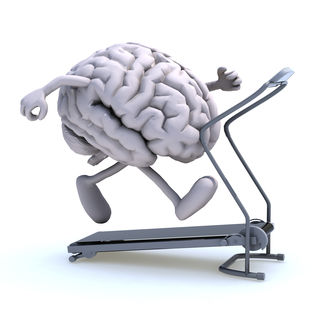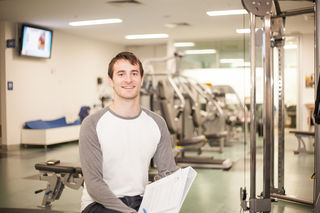Decision-Making
Morning Exercise May Improve Decision-Making During the Day
Morning exercise and 3-minute walking breaks seem to improve executive function.
Posted April 30, 2019 Reviewed by Gary Drevitch

Thirty minutes of moderate-intensity aerobic exercise in the morning improves the cognitive functions associated with better decision-making for the rest of the day, according to a new study by researchers from the University of Western Australia. “Sedentary behavior is associated with impaired cognition, whereas exercise can acutely improve cognition,” the authors said.
This paper, “Distinct Effects of Acute Exercise and Breaks in Sitting on Working Memory and Executive Function in Older Adults,” was published on April 29 in the British Journal of Sports Medicine.
The cohort for this study included 67 males and females (age 55-80). The three-pronged clinical trial was designed to examine the effects of one 30-minute bout of moderate-intensity morning exercise on a treadmill combined with the specific cognitive benefits of taking one three-minute walking break every 30 minutes throughout the day (in comparison to 6.5 hours of uninterrupted sitting) and not working out in the morning.
The primary goal of this three-arm, randomized crossover trial was to evaluate the cognitive effect of various “doses” (intensity x duration) of exercise first thing in the morning and during uninterrupted periods (6.5 hours) of sitting in front of a computer screen.
From a public health perspective, the researchers are on a mission to promote so-called “Brain Breaks” throughout the day as a way to combat the global epidemic of too much sitting. Brain Breaks are also being implemented in Australian schools to help refresh, refocus, and re-energize students throughout the day. (See, “Most of Us Are Still Sitting Too Much. How Can We Sit Less?”)

In this study, first author Michael Wheeler of the Baker Heart & Diabetes Institute and his University of Western Australia (UWA) colleagues found that a morning bout of moderate-intensity aerobic exercise combined with light-intensity walking breaks after every 30-minute period of sitting throughout an eight-hour day was a winning combo for boosting short-term working memory and executive function. Conversely, long periods of uninterrupted sitting were associated with lower scores on working memory tests and subpar executive function.
“Uninterrupted sitting should be avoided to maintain optimal cognition across the day,” Wheeler said in a statement. This new study adds to a growing body of evidence showing that moderate-to-vigorous physical activity (MVPA) has neuroprotective benefits and should be encouraged for the maintenance of brain health across a lifespan.
As mentioned, the latest research from UWA also shows that taking three-minute breaks to walk at a casual, low-intensity pace every 30 minutes during an eight-hour day of prolonged sitting improved executive function associated with better decision-making.
The researchers used "Cogstate" Computerized Cognitive Assessment tests that were conducted at four different time points throughout the day to assess psychomotor function, attention, executive function, visual learning, and working memory.
Interestingly, Wheeler said their three-arm study unearthed “that not all aspects of cognition respond in the same way to a given dose of exercise and that it may be possible to manipulate the pattern of activity across the day to optimize specific cognitive outcomes.”
This statement corroborates the findings of other recent research on various exercise “doses” and specific memory functions. For example, last week researchers from the University of Maryland (Won et al., 2019) reported that 30 minutes of moderate-intensity exertion on a stationary bicycle stimulates semantic memory (e.g., language, words, and names) immediately after a workout. Another study (Heisz et al., 2017), found that high-intensity interval training (HIIT) improved high-interference memory, which is used to recognize familiar faces and other visual patterns.
In a previous post about the cognitive benefits of moderate-intensity exercise, I mentioned that physical activity improves cognitive function and memory by triggering the production of BDNF (which is like Miracle-Gro for the brain) and stimulates the birth of new neurons (neurogenesis) in the hippocampus. The new study by Wheeler et al. (2019) corroborates that Brain-Derived Neurotrophic Factor plays a paramount role in both the survival and growth of information-transmitting neurons in the human brain, and that BDNF is central to mediating the benefits of aerobic exercise on learning and memory.

Wheeler and his co-authors sum up their findings in the paper’s conclusion: “A morning bout of moderate-intensity exercise improves serum BDNF and working memory or executive function in older adults, depending on whether or not subsequent sitting is also interrupted with intermittent light-intensity walking.”
"With an aging population which is looking to live healthier for longer, these studies are critical to people enjoying a productive and satisfying quality of life," Wheeler said in a statement. "This study highlights how relatively simple changes to your daily routine could have a significant benefit to your cognitive health. It also reveals that one day we may be able to do specific types of exercise to enhance specific cognitive skills such as memory or learning."
Facebook Image Credit: michaelheim/Shutterstock
LinkedIn Image Credit: wavebreakmedia/Shutterstock
References
Michael J. Wheeler, Daniel J. Green, Kathryn A. Ellis, Ester Cerin, Ilkka Heinonen, Louise H. Naylor, Robyn Larsen, Patrik Wennberg, Carl-Johan Boraxbekk, Jaye Lewis, Nina Eikelis, Nicola T. Lautenschlager, Bronwyn A. Kingwell, Gavin Lambert, Neville Owen, David W. Dunstan. Distinct Effects of Acute Exercise and Breaks in Sitting on Working Memory and Executive Function in Older Adults: A Three-Arm, Randomised Cross-Over Trial to Evaluate the Effects of Exercise with and without Breaks in Sitting on Cognition." British Journal of Sports Medicine (First published: April 29, 2019) DOI: 10.1136/bjsports-2018-100168
Junyeon Won, Alfonso J. Alfini, Lauren R. Weiss, Corey S. Michelson, Daniel D. Callow, Sushant M. Ranadive, Rodolphe J. Gentili, and J. Carson Smith. "Semantic Memory Activation After Acute Exercise in Healthy Older Adults" Journal of the International Neuropsychological Society (First published: April 25, 2019) DOI: 10.1017/S1355617719000171
Lin Yang, Chao Cao, Elizabeth D. Kantor, Long H. Nguyen, Xiaobin Zheng, Yikyung Park, Edward L. Giovannucci, Charles E. Matthews, Graham A. Colditz and Yin Cao. "Trends in Sedentary Behavior Among the US Population, 2001-2016" JAMA (First published: April 23, 2019) DOI: 10.1001/jama.2019.3636




